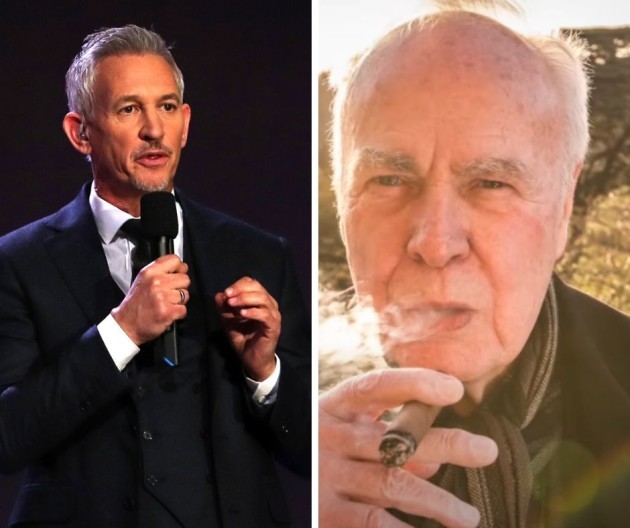This article is a part of Genius Week, a series of features reflecting on sporting genius in its many different forms.
Here, Gavin Cooney draws on the wisdom of Gary Lineker, Danny Kelly and Alan English — all guests on the Behind The Lines podcast — in an attempt to articulate what made Hugh McIlvanney one of sportswriting’s true greats.
__________
SPORTSWRITING IS FILLED with thwarted stars, dreamers who made peace with their insufficient talent at an early age and settled for scribbling in proximity.
But there is no such compromise to make for a gifted few.
“I used to write match reports myself when I was a kid at school”, Gary Lineker tells The42. “I always thought if I didn’t make it at football or cricket I’d probably try to be a sports journalist.”
In his teens, Lineker would make notes from the stands of Leicester’s Filbert Street and then race home and write the report of what he’d witnessed. “They are probably appalling”, he laughs.
Lineker is speaking to us for a special edition of the Behind the Lines podcast celebrating the genius of Hugh McIlvanney, who is by some distance the writer most-cited by the series’ 27 guests to date.
Readers can be grateful McIlvanney wasn’t quite blessed with Lineker’s athletic gifts.
He and his family were instead granted literary talents. His brother William became a Whitbread prize-winning crime fiction writer, while Hugh turned his attention more fully to sport at his local Kilmarnock Standard when introduced to AJ Liebling’s epochal work on boxing, The Sweet Science.
McIlvanney joined the Observer as Deputy Sports Editor in 1962, where he spent three decades, before concluding his career with 23 years at the Sunday Times. It was on the pages of the Observer that Lineker first found McIlvanney’s work: in his mid-twenties Lineker was already preparing for a second life in broadcasting, and his agent Jon Holmes told him to start reading the sports pages more closely.
McIlvanney’s stood out.
“What set him apart? The fact I had to get a dictionary for some of his words! He was an unbelievably good wordsmith. He was almost poetic. I think that’s lifted him above most sports journalists – well, pretty much all of them, to be perfectly honest – and he was just a beautiful writer. You didn’t read his match reports to see what had happened, you read his match reports to see beyond what had happened, and the beauty and magnificence of what happened.”
Among Lineker’s favourites is McIlvanney’s report on the tragic death of Welsh boxer Johnny Owen, a shy fighter who fell into a coma and died as a result of injuries sustained in a fight with Lupe Pintor.
Boxing, McIlvanney wrote, was Johnny Owen’s “one positive means of self-expression.
Outside the ring he was an inaudible and almost invisible personality. Inside, he became astonishingly positive and self-assured. He seemed to be more at home there than anywhere else. It is his tragedy that he found himself articulate in such a dangerous language.”
McIlvanney worked hard to master his language. “ I’ve spoken to Hugh about his writing”, says Lineker “and he told me it took him a long time to write anything. It was an agonising process: he was such a perfectionist he kind of hated the writing of it.”
“He said it as it was”, continues Lineker, “he wasn’t the kind of writer to sugarcoat things. But he recognised greatness when he saw it, and nobody articulated it better.”
“He was a person who brooked no fools, except me”, remembers broadcaster and former NME Editor Danny Kelly, who struck a friendship with McIlvanney when both served as judges of the William Hill Sports Book of the Year award.
“We would argue about things like cat and dog. I would provoke him every now and again by saying things like ‘Johan Cruyff is the greatest footballer who has ever lived’, knowing he would then start up about Pele. It was great being shouted at by Hughie, as he shouted at you with the same erudition and vocabulary as if he were doing a public address.
“So you were getting this amazing massage of language pouring over you. But he could listen, too.”
McIlvanney and Kelly once went for a drink in a small, exclusive club in Soho called Jerry’s. The pair sat down and McIlvanney told Kelly that he appreciated poetry, art, and music, but he just couldn’t understand rock and roll.
Kelly, now the spokesperson for all of rock and roll, went to the bar, asked them to play Who’s Next by the Who, and to play it loud. With the music clanging through the bar and a smattering of arched eyebrows around them, Kelly spent 40 minutes explaining what they were listening to.
“He didn’t stop me once”, says Kelly. “He listened, he drank it all in, and he did terrible damage to a bottle of Dom Perignon. I don’t think he believed one word of what I said, but he was enjoying the argument.”
McIlvanney’s ability to comprehend greatness and its constituent parts, says Lineker, may have its roots in his own commitment to excellence. “I think it’s probably down to working hard and caring, to ambition, and drive. It’s the same as in any walk of life: to get to the top you have to give more than anyone else.”
This was a restless drive at least partly driven by insecurity. After 30 years at the Observer, McIlvanney was appointed Chief Sports Writer of the Sunday Times in 1993. The decision was made by Andrew Neil, then the paper’s Editor. Principled and believing he had a writer thrust upon him without any input, Sports Editor Chris Nawrat offered his resignation. (Nawrat stayed on that occasion but left the Sunday Times over a different issue the following year.)
Also arriving at the Sunday Times in 1993 was Alan English, then as Deputy Sports Editor.
“You didn’t edit Hugh”, Alan told an earlier episode of Behind the Lines. “What you did with Hugh was you eased his fears that the piece might not be any good. People might find it extraordinary, but he had the same insecurity that any of us would have in finishing a piece and sending it to the office, worrying, ‘Christ, is this any good or not?’”
His earliest memory of working with McIlvanney was on a grey Saturday afternoon in January 1994.
It was the first time McIlvanney had shown up at the office, and sat at a desk, puffed at a cigar and spent hours tapping at a keyboard, agonising over certain phrases and the placing of a few commas.
The piece that appeared in the Sunday Times the following morning was McIlvanney’s tribute to Matt Busby, who died four days earlier.
“Granting him a knighthood did not elevate him. It raised, however briefly, the whole dubious phenomenon of the honours system. Busby emanated presence, substance, the quality of strength without arrogance. No man in my experience ever exemplified better the ability to treat you as an equal while leaving you with the sure knowledge that you were less than he was. Such men do not have to be appointed leaders. Some democracy of the instincts and the blood elects them to be in charge.
McIlvanney died 25 years and one day after that piece was published, at the age of 84, and Lineker read that piece at a memorial service in McIlvanney’s honour two months later.
“I remember standing at a lectern ready to read, and very rarely for me, I did feel a little bit nervous. I never felt nervous playing football and I don’t feel nervous doing television or other things, but I felt nervous as I had to do him justice.
“I practiced it a lot as I wanted it to be fluent and passionate, as there was a lot of passion in his writing. My biggest concern is I couldn’t do it in his voice, as he had this most incredible voice, this Scottish, gravelly voice which was inimitable, really.
“It went well enough, thankfully. It was a lot better than writing something myself!”
“His words are immortal, really”, continues Lineker. “His words will always be with us. You may not be able to speak with him anymore but you will always be able to read his stuff.”
Let’s conclude with a few of those words.
But what to choose? You could have his intro to his report on the Rumble in the Jungle: “Muhammad Ali would not settle for any ordinary old resurrection. His had to have an additional flourish. So, having rolled away the rock, he hit George Foreman on the head with it”
Or his description of George Best, a player of balance “that would have made Isaac Newton decide he might as well have eaten the apple.”
You could also pick his tee-up of the 1986 World Cup final – “Earlier days offer sudden death, but this is the only one that offers immortality” – or his describing Alex Ferguson’s lingering shock at being beaten 5-1 by Manchester City as that of a man “awed by the depth of his own feelings.”
Instead, let’s pick a couple of lines from a piece McIlvanney wrote for the Observer in January, 1988, about one Gary Lineker.
“Whether they like it or not, the top performers in sport cannot escape the certainty that they will be judged against heroic standards. Try as they might, they can never impose purely pragmatic values on their world.
“We all know that if sport isn’t romantic it is nothing. How can grown men justify taking bundles of money for boys’ games unless they acknowledge that what they are engaged in is ultimately as elaborately contrived as theatre?
“The scarcely astonishing answer is that most are too profoundly absorbed by the dramas of a thigh strain or an incipient loss of form to be even remotely aware of the question.
“They are happy to let others dwell on the strangeness of their predicament.”
The42 Podcasts / SoundCloud
All of the material for this piece is taken from episodes of our sportswriting podcast, Behind the Lines.
To listen to the interview with Gary Lineker in full, follow this link.
To subscribe and gain access to the full, 30-episode back catalogue, click here.




